Key takeaways:
- Key components affecting smartphone gaming performance include CPU speed, GPU capabilities, RAM, thermal management, and battery health.
- Optimizing device settings by adjusting display brightness, closing background apps, and managing battery settings can enhance gaming experiences.
- Using accessories like gaming headsets, controllers, power banks, and cooling pads can significantly improve performance and immersion in mobile gaming.
- Comparing gaming performance benchmarks, such as frame rates and thermal efficiency, is crucial for selecting a device that meets gaming needs.
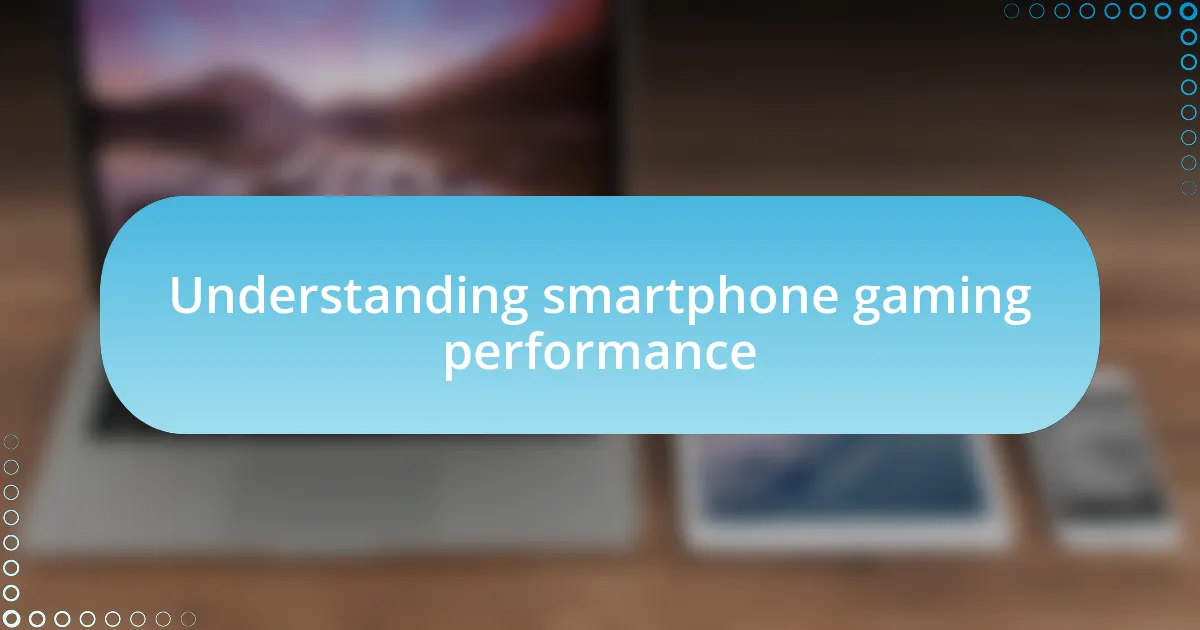
Understanding smartphone gaming performance
When diving into smartphone gaming performance, it’s essential to consider factors like CPU speed and GPU capabilities. I still remember the first time I upgraded to a phone with a powerful processor; the difference in how games loaded and ran was astounding. It’s like going from a slow stroll to an exhilarating sprint.
Another aspect that often gets overlooked is RAM. I used to experience frustrating lags during intense moments in games, but once I invested in a device with ample RAM, everything changed. Have you ever been in a gripping game only to have it freeze? It’s a reminder of how crucial this component is for seamless gaming.
Battery life, too, plays a significant role in the overall experience. There were days I’d get so caught up in a game that I’d drain my battery in no time. It got me thinking: how can we balance performance and longevity? Finding a device that offers both has become a game-changer for my gaming sessions.
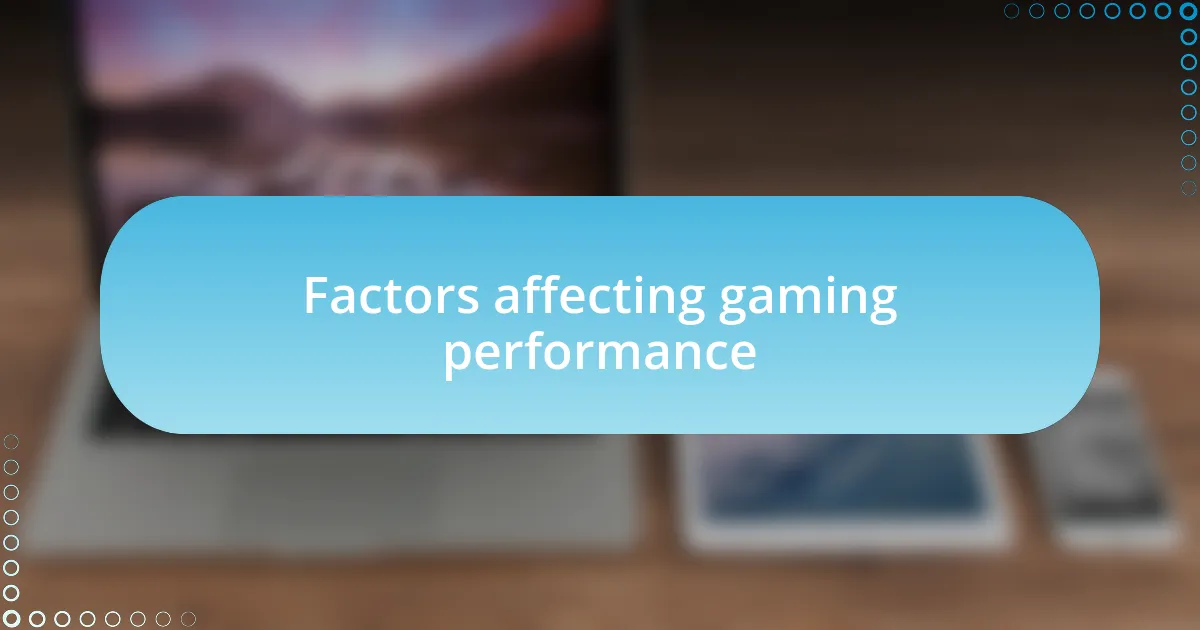
Factors affecting gaming performance
There are several key factors that significantly impact gaming performance on smartphones. One notable element is the temperature of the device. I vividly recall sitting with my phone on my lap during an intense gaming session, only to feel it heating up to an uncomfortable degree. That heat can throttle performance, leading to frustrating slowdowns right when you’re most engaged in the action.
Here are some critical factors affecting gaming performance:
- CPU Speed: A faster CPU can process game data more swiftly, reducing loading times and improving responsiveness.
- GPU Capabilities: The graphics processing unit is essential for rendering high-quality visuals.
- RAM: Adequate RAM allows for a smoother experience, especially when multitasking or running demanding games.
- Thermal Management: Good heat dissipation can maintain optimal performance during extended gaming.
- Battery Health: A strong battery not only powers your device longer but also ensures consistent output under load.
Another crucial aspect to consider is software optimization. I’ve encountered games that just didn’t perform well, despite having the latest hardware. It’s like having a race car but getting stuck on a rough road. Developers often release updates that tweak performance, so keeping your games and operating system updated is vital.

Choosing the right smartphone
Choosing the right smartphone for gaming can feel overwhelming. I still remember the excitement of buying my first gaming phone, only to discover it didn’t handle the latest titles as expected. It’s crucial to pick a device with a powerful CPU and GPU, as these components are like the engine and tires of a high-performance car; without them, you’ll struggle to keep up even on straightforward tracks.
When selecting a smartphone, don’t overlook the importance of RAM. I once chose a phone with just 4GB of RAM, thinking it would suffice, but I constantly faced frustrating lag during intense battle sequences. Upgrading to a device with 8GB or more made a world of difference; I could smoothly switch between gameplay and other tasks, amplifying my overall gaming enjoyment.
Take the time to research battery life and thermal management as well. I recall a gaming marathon where my device simply shut down due to overheating. It was a real buzzkill! Devices with robust cooling systems can help prevent these interruptions, enabling longer gaming sessions without the fear of your phone dropping out at a critical moment.
| Feature | Importance |
|---|---|
| CPU Speed | Critical for reducing loading times and ensuring responsive gameplay |
| GPU Capabilities | Essential for rendering visually stunning graphics |
| RAM | Helps with multitasking and smooth performance |
| Battery Life | Supports longer gaming sessions without interruptions |
| Thermal Management | Prevents overheating and maintains stability during long play |
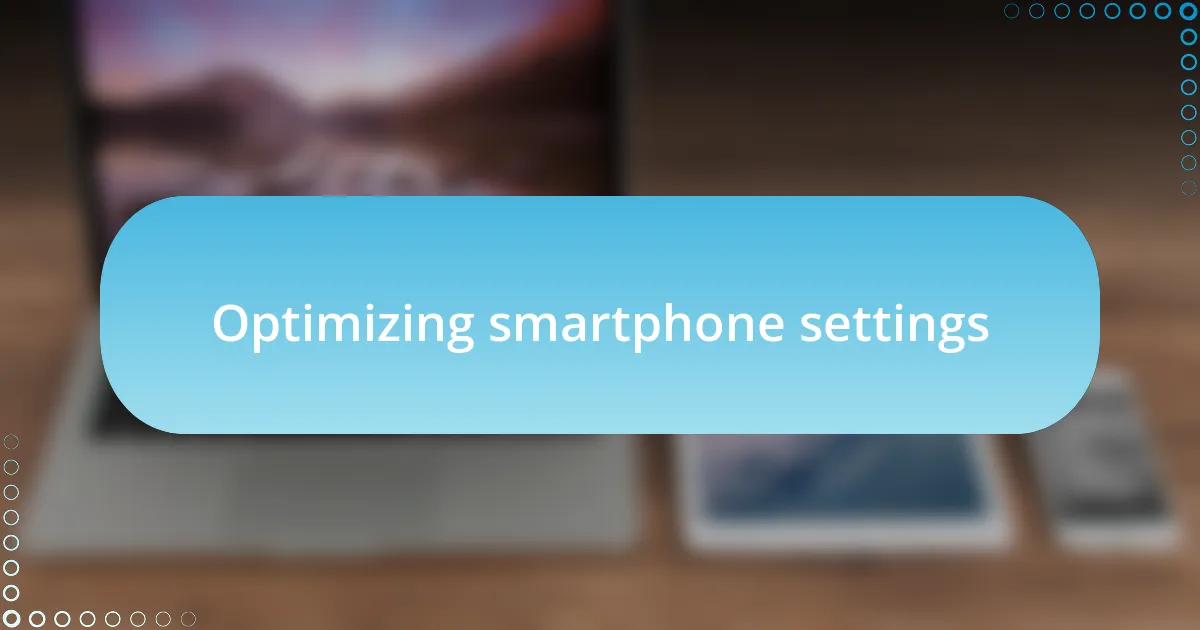
Optimizing smartphone settings
When it comes to optimizing smartphone settings for gaming, the first step I always take is to adjust the display settings. I vividly recall the time I played a visually intensive game and realized my brightness was set too low. It made everything look dull and hard to see, detracting from the overall experience. Now, I always crank up the brightness and enable features like HDR, which truly enhances the graphics and brings the game to life.
Next, I can’t stress enough how important it is to close background apps. There was a phase where I didn’t think it mattered much, until I noticed significant lag during crucial moments, especially in competitive games. By simply swiping away unnecessary applications, I freed up resources and improved my device’s performance. It’s like clearing clutter from your desk — suddenly, everything feels more organized and efficient.
Battery optimization settings also play a key role in my gaming sessions. I remember a tense multiplayer match when my phone’s battery saver mode kicked in unexpectedly, dimming my screen and reducing performance. Now, I ensure that my device is in gaming mode or do-not-disturb mode, allowing me to fully immerse myself without those annoying interruptions. How have you configured your settings to enhance your gaming experience?
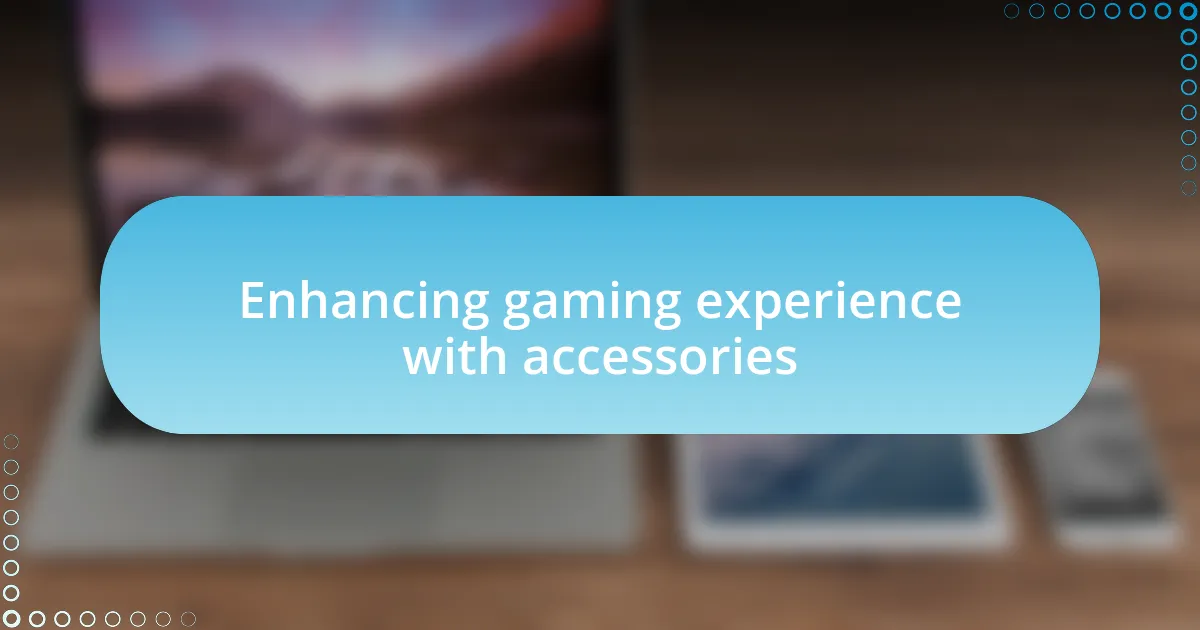
Enhancing gaming experience with accessories
Enhancing your gaming experience goes beyond adjusting settings; using the right accessories can make a world of difference. For instance, when I first invested in a quality gaming headset, I was blown away by the immersive sound quality. I still remember the thrill of hearing footsteps before I even saw my opponents. Have you ever experienced that rush? It truly feels like you’re part of the game.
Another accessory that significantly boosted my gaming performance is a mobile controller. I used to struggle with on-screen controls, which often led to frustrating moments during high-stakes gameplay. Once I switched to a controller, everything changed. The tactile feedback and better grip allowed me to execute complex maneuvers with ease. It felt like switching from a bicycle to a sports car — both can get you from point A to B, but one is just far more exhilarating.
Don’t overlook power banks and cooling pads either. The first time I played for hours and noticed my phone heating up, I realized I needed a solution. I picked up a cooling pad, and the difference was immediate; my phone stayed cool, and I could focus on what mattered most — the game. Have you found accessories that transformed your experience like this?
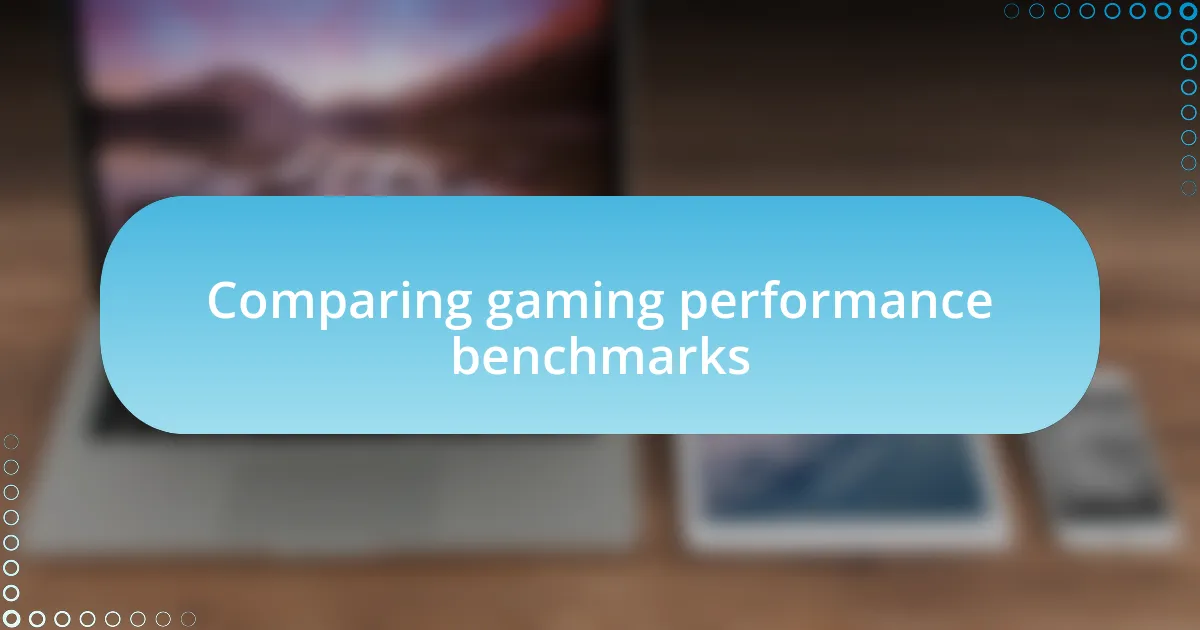
Comparing gaming performance benchmarks
When it comes to comparing gaming performance benchmarks, I’ve noticed that frame rates often take center stage. For instance, I vividly remember testing two similar devices; one delivered a smooth 60 frames per second while the other struggled at 30. The difference in gameplay was stark, making one device feel responsive and enjoyable, while the other left me frustrated during intense moments—ever experienced that jarring lag?
Then there’s the aspect of thermal performance, which I learned the hard way. I once played an action-packed mobile game on a device that overheated quickly. The performance dropped significantly, resulting in stuttery visuals and unresponsive controls. Now, I always check benchmark reviews that highlight cooling efficiency, which has become essential for longer gaming sessions. Wouldn’t it be great to focus on the game rather than worrying about your phone burning up?
Battery life is another crucial benchmark that shouldn’t be overlooked. I recall a weekend spent gaming on a phone that promised long hours of playtime but died unexpectedly halfway through a multiplayer match. I’ve since prioritized devices that not only offer impressive specs but also come with robust battery ratings, ensuring my gaming isn’t cut short because of low power. How about you? What benchmarks do you find yourself studying before making a decision?
















